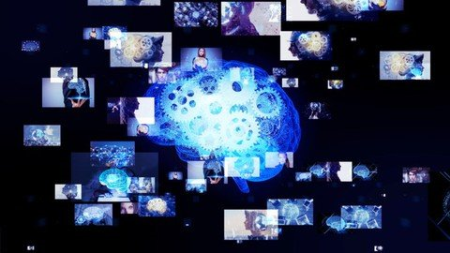
Published 6/2022MP4 | Video: h264, 1280x720 | Audio: AAC, 44.1 KHzLanguage: English | Size: 3.07 GB | Duration: 8h 22m
Become an expert in Deep Learning with Facebook's PyTorch
What you'll learn
understand Deep Learning fundamentals
learn all relevant aspects of PyTorch to develop state-of-the-art models
develop image classification models
develop object detection models
create artistic images with Style Transfer
use transfer learning
Requirements
basic Python knowledge
Description
PyTorch is a Python framework developed by Facebook to develop and deploy Deep Learning models.
It is one of the most popular Deep Learning frameworks nowadays. You will learn everything that is needed for developing and applying deep learning models to your own data. All relevant and state of the art model architectures will be covered. After this course you will be able to apply your knowledge to your own data so that you can train models for regression, classification, computer vision, and series data. It is important to me that you learn the underlying concepts as well as how to implement the techniques. You will be challenged to tackle problems on your own, before I present you my solution.In my course I will teach you:Introduction to Deep Learninghigh level understandingperceptronslayersactivation functionsloss functionsoptimizersTensor handlingcreation and specific features of tensorsautomatic gradient calculation (autograd)Modeling introduction, incl. Linear Regression from scratchunderstanding PyTorch model trainingBatchesDatasets and DataloadersHyperparameter Tuningsaving and loading modelsClassification modelsmultilabel classificationmulticlass classificationConvolutional Neural NetworksCNN theorydevelop an image classification modellayer dimension calculationimage transformationsObject Detectionobject detection theorydevelop an object detection modelStyle TransferStyle transfer theorydeveloping your own style transfer modelPretrained Models and Transfer LearningRecurrent Neural NetworksRecurrent Neural Network theorydeveloping LSTM modelsAutoencodersGenerative Adversarial NetworksEnroll right now to learn some of the coolest techniques and boost your career with your new skills.Best regards,Bert
Overview
Section 1: Course Overview & System Setup
Lecture 1 Course Overview
Lecture 2 PyTorch Introduction
Lecture 3 System Setup
Lecture 4 How to Get the Course Material
Lecture 5 Setting up the conda environment
Section 2: Machine Learning
Lecture 6 Artificial Intelligence (101)
Lecture 7 Machine Learning (101)
Lecture 8 Machine Learning Models (101)
Section 3: Deep Learning Introduction
Lecture 9 Deep Learning General Overview
Lecture 10 Deep Learning Modeling 101
Lecture 11 Performance
Lecture 12 From Perceptron to Neural Network
Lecture 13 Layer Types
Lecture 14 Activation Functions
Lecture 15 Loss Functions
Lecture 16 Optimizers
Section 4: Model Evaluation
Lecture 17 Underfitting Overfitting (101)
Lecture 18 Train Test Split (101)
Lecture 19 Resampling Techniques (101)
Section 5: Tensors
Lecture 20 Section Overview
Lecture 21 From Tensors to Computational Graphs (101)
Lecture 22 Tensor (Coding)
Section 6: Modeling Introduction
Lecture 23 Section Overview
Lecture 24 Linear Regression from Scratch (Coding, Model Training)
Lecture 25 Linear Regression from Scratch (Coding, Model Evaluation)
Lecture 26 Model Class (Coding)
Lecture 27 Exercise: Learning Rate and Number of Epochs
Lecture 28 Solution: Learning Rate and Number of Epochs
Lecture 29 Batches (101)
Lecture 30 Batches (Coding)
Lecture 31 Datasets and Dataloaders (101)
Lecture 32 Datasets and Dataloaders (Coding)
Lecture 33 Saving and Loading Models (101)
Lecture 34 Saving and Loading Models (Coding)
Lecture 35 Model Training (101)
Lecture 36 Hyperparameter Tuning (101)
Lecture 37 Hyperparameter Tuning (Coding)
Section 7: Classification Models
Lecture 38 Section Overview
Lecture 39 Classification Types (101)
Lecture 40 Confusion Matrix (101)
Lecture 41 ROC curve (101)
Lecture 42 Multi-Class 1: Data Prep
Lecture 43 Multi-Class 2: Dataset class (Exercise)
Lecture 44 Multi-Class 3: Dataset class (Solution)
Lecture 45 Multi-Class 4: Network Class (Exercise)
Lecture 46 Multi-Class 5: Network Class (Solution)
Lecture 47 Multi-Class 6: Loss, Optimizer, and Hyper Parameters
Lecture 48 Multi-Class 7: Training Loop
Lecture 49 Multi-Class 8: Model Evaluation
Lecture 50 Multi-Class 9: Naive Classifier
Lecture 51 Multi-Class 10: Summary
Lecture 52 Multi-Label (Exercise)
Lecture 53 Multi-Label (Solution)
Section 8: CNN: Image Classification
Lecture 54 Section Overview
Lecture 55 CNNs (101)
Lecture 56 CNN (Interactive)
Lecture 57 Image Preprocessing (101)
Lecture 58 Image Preprocessing (Coding)
Lecture 59 Binary Image Classification (101)
Lecture 60 Binary Image Classification (Coding)
Lecture 61 MultiClass Image Classification (Exercise)
Lecture 62 MultiClass Image Classification (Solution)
Lecture 63 Layer Calculations (101)
Lecture 64 Layer Calculations (Coding)
Section 9: CNN: Object Detection
Lecture 65 Section Overview
Lecture 66 Accuracy Metrics (101)
Lecture 67 Object Detection (101)
Lecture 68 Object Detection (Coding)
Lecture 69 Training a Model on GPU for free (Coding)
Section 10: Style Transfer
Lecture 70 Section Overview
Lecture 71 Style Transfer (101)
Lecture 72 Style Transfer (Coding)
Section 11: Pretrained Networks and Transfer Learning
Lecture 73 Section Overview
Lecture 74 Transfer Learning and Pretrained Networks (101)
Lecture 75 Transfer Learning (Coding)
Section 12: Recurrent Neural Networks
Lecture 76 Section Overview
Lecture 77 RNN (101)
Lecture 78 LSTM (Coding)
Lecture 79 LSTM (Exercise)
Lecture 80 LSTM (Solution)
Section 13: Autoencoders
Lecture 81 Section Overview
Lecture 82 Autoencoders (101)
Lecture 83 Autoencoders (Coding)
Section 14: Generative Adversarial Networks
Lecture 84 Section Overview
Lecture 85 GANs (101)
Lecture 86 GANs (Coding)
Lecture 87 GANs (Exercise)
Section 15: Closing Remarks
Lecture 88 Thank you & Further Resources
Python developers willing to learn one of the most interesting and in-demand techniques
HomePage:
Https://anonymz.com/https://www.udemy.com/course/pytorch-ultimate/DOWNLOAD
uploadgig.com
https://uploadgig.com/file/download/38eb9A8e16DEae44/PyTorch_Ultimate_.part1.rar
https://uploadgig.com/file/download/8929Ac0003b23c4c/PyTorch_Ultimate_.part2.rar
https://uploadgig.com/file/download/2f756A5611dc9Cc5/PyTorch_Ultimate_.part3.rar
https://uploadgig.com/file/download/8555A0Db04c57dBA/PyTorch_Ultimate_.part4.rar
rapidgator.net
https://rapidgator.net/file/e1495b785844a421fd8b3c7300a1e701/PyTorch_Ultimate_.part1.rar.html
https://rapidgator.net/file/c586275b04667b3b9b50cb7f7234872e/PyTorch_Ultimate_.part2.rar.html
https://rapidgator.net/file/79f3a097ea909fb7616a145291cb25c9/PyTorch_Ultimate_.part3.rar.html
https://rapidgator.net/file/13b161ddf15198f8a95c385a1ec1e6f3/PyTorch_Ultimate_.part4.rar.html
nitro.download
https://nitro.download/view/4FD94B961D5D3B6/PyTorch_Ultimate_.part1.rar
https://nitro.download/view/57618E29E5E50E5/PyTorch_Ultimate_.part2.rar
https://nitro.download/view/A891A25F2BE7CDB/PyTorch_Ultimate_.part3.rar
https://nitro.download/view/758C23D030634F8/PyTorch_Ultimate_.part4.rar

